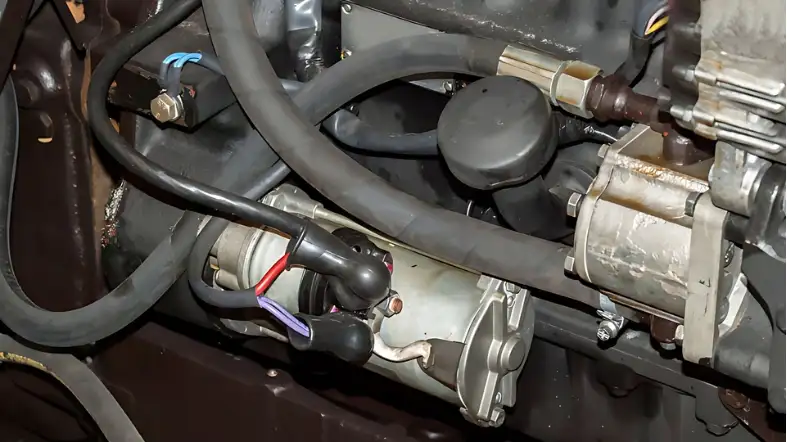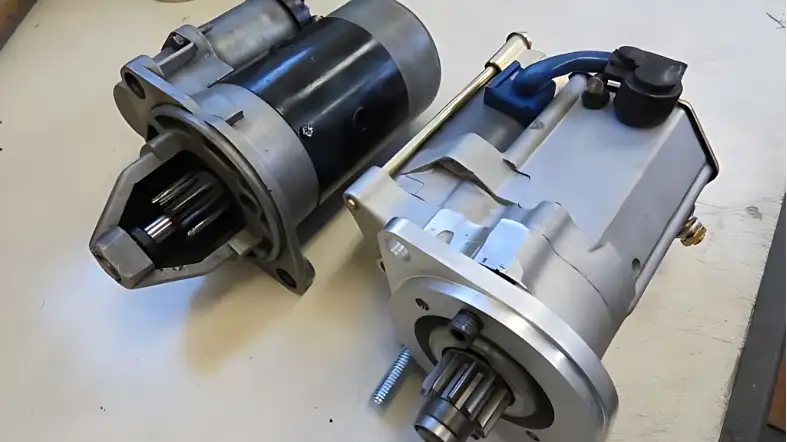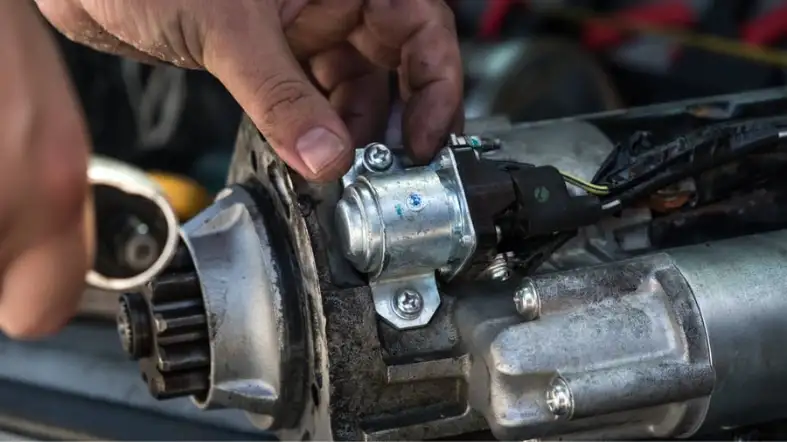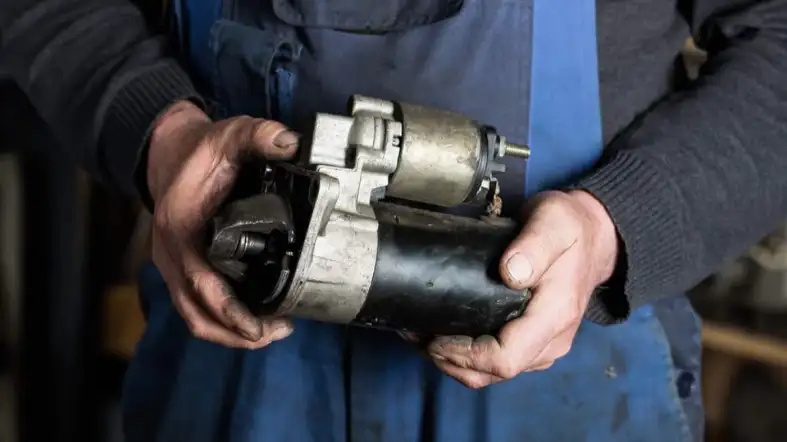Have you ever wondered what a bad starter actually sounds like? It’s not just a simple click or silence, oh no.
A bad starter can make a range of noises that can leave you scratching your head in confusion.
From grinding and whirring to screeching and groaning, a bad starter can make quite the symphony of unpleasant sounds.
In this blog, we’ll delve into the world of bad starters and explore the different noises they make, so you can identify and fix the problem before it leaves you stranded on the side of the road.
How does a bad starter sound?
When a starter in a car is bad, it can make some very distinct sounds.

For example, when you turn the key to start the car, you might hear a clicking noise or a grinding noise.
The clicking noise typically means that the starter is not getting enough power, which could be caused by a weak battery or a faulty starter motor.
The grinding noise, on the other hand, usually means that the starter motor is not engaging properly with the engine’s flywheel.
This can be caused by worn out gears in the starter motor or damage to the flywheel itself.
Either way, if you hear any unusual sounds when you try to start your car, it’s a good idea to have a mechanic take a look to diagnose the problem before it gets worse.
What are some common causes of a bad starter?
A bad starter is a common problem that can prevent your car from starting properly.
It’s important to be aware of the common causes of a bad starter so you can address the issue quickly and get your vehicle back on the road.
Here are some of the most common causes of a bad starter:
1. Dead Battery: If your car battery is dead or has low voltage, it can prevent the starter from receiving enough power to start the engine.
In this case, you may hear a clicking sound when you turn the key, but the engine won’t start.
2. Faulty Starter Motor: The starter motor is responsible for turning the engine over when you turn the key.
If the starter motor is faulty or damaged, it may not be able to turn the engine over, which can cause your car not to start.
3. Damaged Starter Solenoid: The starter solenoid is an electrical component that sends power from the battery to the starter motor.
If the solenoid is damaged, it can prevent the starter motor from receiving enough power to start the engine.
4. Corroded Connections: Corroded or loose connections can prevent the starter from receiving enough power to start the engine.
If you notice corrosion or rust on the battery terminals or other electrical connections, it’s important to clean them or replace them as soon as possible.
5. Faulty Ignition Switch: The ignition switch is responsible for sending power to the starter motor when you turn the key.
If the ignition switch is faulty, it may not send enough power to the starter motor, which can prevent the engine from starting.
6. Worn-out Starter Drive Gear: The starter drive gear is responsible for engaging with the engine’s flywheel to turn the engine over.
If the starter drive gear is worn out or damaged, it may not be able to engage properly with the flywheel, which can prevent the engine from starting.
How to diagnose a bad starter?

Diagnosing a bad starter is an essential task for any vehicle owner.
If your car doesn’t start or makes a clicking sound when you turn the key, it might be a sign of a bad starter. Here, we will discuss how to diagnose it:
1. Check the Battery: Make sure the battery is fully charged and has enough power to start the engine.
If the battery is weak or dead, try jump-starting the vehicle or replacing the battery.
2. Check the Connections: Check the connections on the starter and make sure they are clean and tight. Loose or dirty connections can cause the starter to malfunction.
3. Listen for Noise: Listen for any grinding or clicking noises when you try to start the engine. If you hear these noises, it could be a sign of a bad starter.
4. Check the Solenoid: The solenoid is responsible for engaging the starter gear with the flywheel. Check the solenoid and make sure it’s functioning correctly.
5. Test the Starter: If you’ve checked all the other components and still suspect a bad starter, you can test it using a multimeter or have a professional mechanic test it for you.
How to fix a bad starter?

When your starter fails, your car won’t start, leaving you stranded or in a potentially dangerous situation.
Fortunately, there are several steps you can take to fix a bad starter. Here are some things you can try:
1. Check the battery: Before you do anything else, make sure the battery is fully charged and in good working order.
A dead or weak battery can cause the starter to fail.
2. Inspect the connections: The starter motor relies on a series of electrical connections to operate properly.
Check to make sure all the wires are securely connected and free of corrosion or damage.
If any of the connections are loose, tighten them up. If any of the wires are damaged, replace them.
3. Tap the starter: Sometimes a bad starter can be fixed by giving it a few light taps with a hammer or other tool.
This can help free up any stuck components and get the starter motor turning again.
4. Clean the starter: If the starter motor is covered in dirt or grime, it may not be able to function properly.
Use a wire brush or other cleaning tool to clean the starter motor and any surrounding components.
5. Replace the starter: If none of the above steps work, you may need to replace the starter motor.
This can be a complex job, so it’s usually best left to a professional mechanic.
They can diagnose the problem, source the appropriate replacement parts, and install them properly.
How to prevent starter problems from occurring?

Here are some tips on how to prevent starter problems in your car from occurring:
1. Keep your battery in good condition: The battery is responsible for providing the initial power to your car’s starter, so it’s important to keep it in good condition.
Make sure it’s properly charged and clean, and consider replacing it if it’s more than a few years old.
2. Park in a garage or covered area: Extreme temperatures can cause wear and tear on your car’s starter.
By parking in a garage or covered area, you can help protect your starter from the elements.
3. Turn off electronics before starting the car: When you start your car, it requires a significant amount of power from the battery.
If you have electronics (like the radio or air conditioning) running, it can drain the battery and make it harder for the starter to do its job.
4. Don’t “over-crank” the engine: If your car doesn’t start immediately, don’t continue cranking the engine over and over again.
This can put unnecessary strain on the starter and drain the battery. Instead, wait a few seconds between attempts to start the car.
5. Have your starter checked regularly: Like any part of your car, your starter can wear out over time.
By having it checked regularly (especially if you notice any warning signs like slow cranking or clicking noises), you can catch problems early and prevent them from becoming bigger issues.
FAQs
1. Can A Bad Starter Damage My Engine?
In most cases, a bad starter will not damage your engine.
However, if you continue to try and start your car with a bad starter, it can cause damage to other parts of the car, such as the battery or the alternator.
2. How Long Does A Starter Typically Last?
The lifespan of a starter can vary depending on the make and model of your car, as well as your driving habits.
In general, a starter can last anywhere from 50,000 to 100,000 miles.
3. Can I Replace My Starter Myself, Or Do I Need To Take It To A Mechanic?
Replacing a starter can be a challenging job, and it may be best to take it to a mechanic if you are not experienced with car repairs.
However, if you are comfortable working on cars and have the proper tools, you may be able to replace the starter yourself.
4. How Much Does It Typically Cost To Replace A Starter?
The cost of replacing a starter can vary depending on the make and model of your car, as well as the cost of the replacement part and the labor involved in the repair.
In general, you can expect to pay anywhere from $150 to $500 for a starter replacement.
5. Can I Drive My Car With A Bad Starter?
If your starter is completely dead, you will not be able to drive your car until it is replaced.
However, if your starter is only partially bad, you may be able to drive your car for a short distance before it completely fails.
It is not recommended to continue driving your car with a bad starter, as it can cause further damage to other parts of the car.
Conclusion
A bad starter can make some pretty unpleasant sounds that can be quite alarming.
You might hear a grinding or clicking noise when you turn the key, or the engine might simply fail to start altogether.
It’s important to address these issues as soon as possible to avoid getting stranded with a car that won’t start.
So if you notice any unusual sounds when you try to start your car, don’t ignore them – take your car to a mechanic and get it checked out.
Trust us, your car (and your ears) will thank you!
